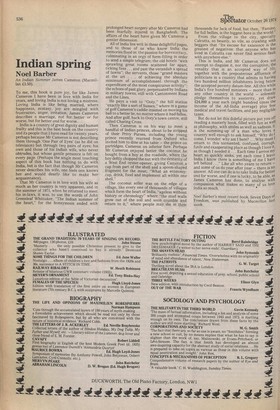Indian spring
Noel Barber
An Indian Summer James Cameron (Macmillan £3.50).
To me, this book is pure joy, for like James Cameron I have been in love with India for years, and loving India is not loving a mistress. Loving India is like being married, where happiness, ecstasy, joy are mingled with frustration, anger, irritation. James Cameron describes a marriage, not for better or for worse, but for better and for worse.
India is a country of great dignity and human frailty and this is the best book on the country and its people that I have read for twenty years, perhaps because Mr Cameron is not describing them through 'One Pair of Eyes' (as he did on television) but through two pairs of eyes; his own and those of his Indian wife, who never obtrudes, but whose gentle presence is felt on every page. (Perhaps the single most touching aspect of this book has nothing to do with India, but is the fact that though Mr Cameron never describes his wife, one feels one knows her and would dearly like to make her acquaintance).
That Mr Cameron is in love with his wife as much as her country is very apparent, and in the summer of 1971, when he returned to meet his in-laws, it was, to use the words of John Greenleaf Whittaker, The Indian summer of the heart," for the honeymoon ended with prolonged heart surgery after Mr Cameron had been fearfully injured in Bangladesh. The affairs of the heart have given Mr Cameron a gentler dimension.
All of India lies writ in these delightful pages, and to those of us who know India the memories flood in: the passion for bureaucracy, culminating in an orgy of form-filling in order to send a simple telegram; the old hotels "with sprawling great rooms scattered far apart, ticking fans ... and past the verandah a spread of lawns"; the servants, those "grand masters at the art . . . of achieving the absolute minimum of accomplishment through the expenditure of the most conspicuous activity"; the echoes of past glory, perpetuated by Indians in military towns, still with Cantonment Road and the Lines.
He pays a visit to "Ooty," the hill station "exactly like a sort of Sussex," where in a game. of golf Cameron's caddie insisted on moving his ball to a better lie, no matter where it had fallen. And after golf, back to Ooty's town centre, still called Charing Cross.
Then Cameron is on his way to meet a handful of Indian princes, about to be stripped of their Privy Purses, including the young prince recently reurned from Oxford who invited him to dine at his table — the prince on partridges, Cameron on inferior fare. Perhaps Mr Cameron enjoyed better the coconut he bought from a boy at the roadside, where the boy deftly chopped the nut with the dexterity of a West End oyster-opener, giving Cameron a cup from part of the shell and a spoon-shaped fragment for the meat; "What an economy: cup, drink, food and implement all within one shell."
The coconut seller was on the edge of a village, like every one of thousands of villages which form the heart of India, "ageless without history or chronology" where "the mud walls grow out of the soil and soon crumble and return to it," where people may die in their
thousands for lack of food, but then, "Famine,: for full bellies, is the biggest bore in the world.
From the village to the city, specially Calcutta, so beastly, so vile, so crawling with beggars that "Its excuse for existence is the greatest of negatives: that anyone who has lived in Calcutta can never find serious fault with anywhere else." This is India, and Mr Cameron does not attempt to disguise it, nor the corruption, the venality that is an accepted way of life, together with the preposterous affluence. of politicians in a country that admits to having two hundred million inhabitants living beloW the accepted poverty datum-line. All this while India's five hundred ministers — more than el any other country in the world — solemnlY pledge themselves to austerity, yet draw E24,000 a year each (eight hundred times the income of the All-India average) plus free medical and travel facilities, and pay negligible taxes.
But do not let this doleful picture put you off reading a masterly book, filled with fun as well as philosophy, with smiles as well as sadness. It is the summing-up of a man who loves a country well enough to ask himself, "why do I come, I wonder: why am I here? .. . Why must I return to this tormented, confused, corrupt, futile and exasperating place as though I love as though I needed it. . . Each time I arrive MY heart so quickly sinks, yet each time I leave India I know there is something of me I have left behind . ." Like all who yearn to return — and some of us do year after year — there is no answer. All one can do is to take India for better and for worse, and if one is lucky, to be able, as James Cameron has done, to analyse with compassion what makes so many of us love India so much.
Noel Barber's most recent book, Seven Days Of Freedom, was published by Macmillan last week.










































 Previous page
Previous page